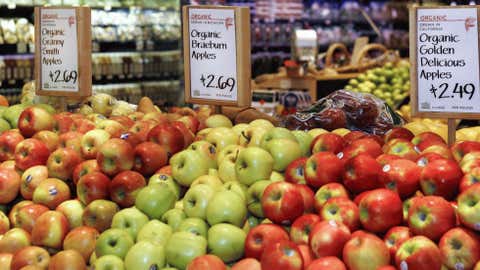


Organic apples are seen in the produce section at the Whole Foods Market in Willowbrook, Illinois.
(Getty Images)
Organic products have no significant nutritional advantage over conventional foods, even though consumers can pay more for them, a new study finds.
The findings suggest that a key reason behind why many people buy organic products -- a $28.6 billion market last year -- may not be borne out by the science.
(MORE: Health Articles)
The four-year project began when two doctors wondered what advice they should give their families and patients about whether to buy organic or conventional foods.
"It became much larger than we expected," says Crystal Smith-Spangler, a primary care doctor at Stanford University and lead author on the study appearing Tuesday in the journal Annals of Internal Medicine.
Eventually, 12 researchers looked at 240 studies conducted from 1966 to 2011 covering nutrient and contaminant levels in foods. The findings:
There were no significant differences in the vitamin content of organic and conventional fruits and vegetables. The studies looked specifically at vitamins A, C and E.Detectable pesticide residue was found in 7 percent of organic produce and 38 percent of conventional produce. However, only three studies found pesticide residue that exceeded maximum allowed limits in the European Union on organic or conventional produce.Both organic and conventional foods were at similar risk for bacterial contamination.
As to how pesticides could be in organic product that must be grown without them by law, Smith-Spangler said it could either be long-lasting, now-banned pesticides in the soil or drift from nearby fields.
A smaller study done in 2009 by Alan Dangour at the London School of Hygiene and Tropical Medicine with a European emphasis reached similar conclusions.
A Safeway customer browses the fruit and vegetable section at Safeway's new 'Lifestyle' store.
(Getty Images)
Organic produce often costs more than conventionally grown fruits and vegetables, but the differential varies widely. In 2009, it generally cost at least 25 percent more in Boston and San Francisco wholesale markets and sometimes was double the price, according to the most recent data from the U.S. Department of Agriculture. In rare cases, the organic food was equal or even a smidge lower in price.
Yet "there isn't much difference between organic and conventional foods, if you're an adult and making a decision based solely on your health," said Dena Bravata, senior author of the paper and a physician at Stanford's Center for Health Policy.
The data doesn't fit well with consumers' stated motivations for buying organic foods. A 2010 Nielsen study found that 76 percent bought them believing they are healthier, 53 percent because they allowed them to avoid pesticides and other toxins, 51percent because they are more nutritious and 49percent because organic farming is better for the environment.
Urvashi Rangan, a scientist at Consumer's Union, publisher of Consumer Reports magazine, points out that organic farming originally started out as something designed to be better for the environment and for farmers.
"The health benefits really ended up being almost inadvertent, a nice fringe benefit" of farming in a sustainable way that benefits the planet, she says.
That once counter-culture trend is now mainstream. Organic foods make up 12percent of all U.S. fruit and vegetable sales, according to Christine Bushway, CEO of the Organic Trade Association in Brattleboro, Vt. Organic products account for nearly 6percent of the total U.S. market for dairy products, she says.
A statement from the association said the new findings confirm that organics reduce consumers' exposure to pesticides and overuse of antibiotics can lead to higher levels of bacteria resistant to antibiotics in meat.
Different people will make different choices, Smith-Spangler says. "There may be some consumers who feel that any pesticide residue that's detectable is unacceptable to them." Others may trust government standards for allowable limits and be less concerned.
Pregnant women and families with small children are most likely to err on the side of caution, Rangan says. "Is it in some ways healthier to have less pesticides in your body, especially if you're a kid? Absolutely," she says. That fits with findings by the Organic Trade Association that 48percent of parents say they believe organic foods "are healthier for me and my children." Those surveys showed that 78percent of U.S. families bought at least some organic foods in 2011.
Smith-Spangler says consumers should know there is overwhelming evidence that eating produce improves health -- so whatever you choose to buy, load up on fruits and veggies.